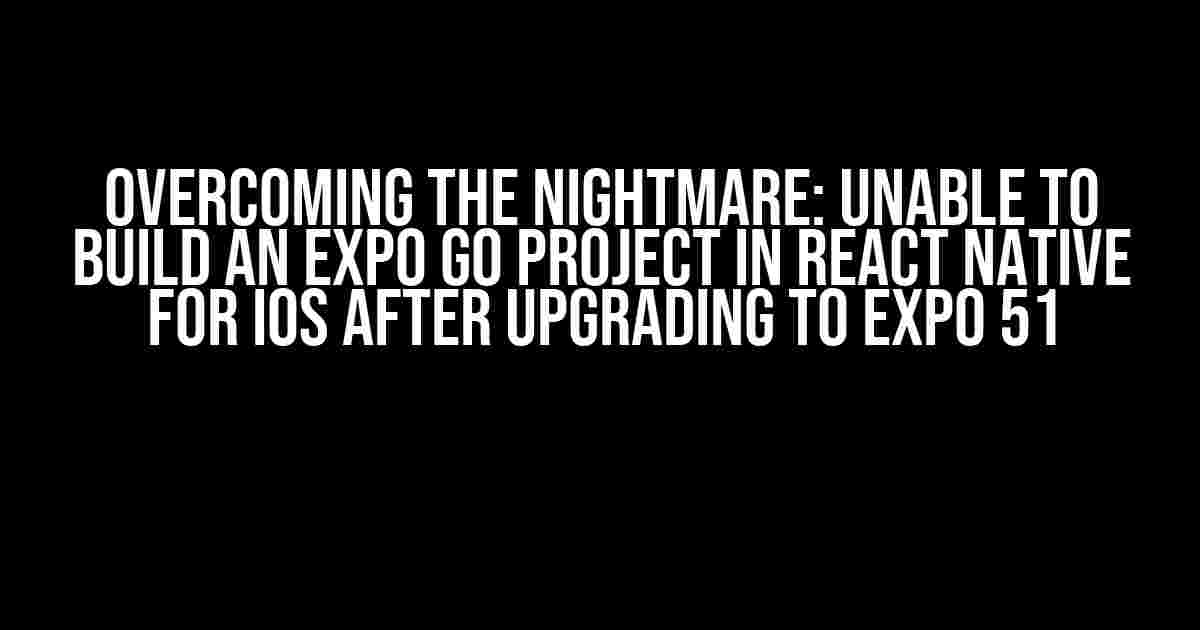Are you stuck in the frustrating loop of errors and warnings after upgrading to Expo 51? You’re not alone! Many developers have faced the daunting task of resolving the “Unable to build an Expo Go project in React Native for iOS” issue. Fear not, dear reader, for we’ve got you covered. In this article, we’ll dive into the solutions to get your project up and running smoothly.
Understanding the Issue
The “Unable to build an Expo Go project in React Native for iOS” error typically occurs when there’s a mismatch between the Expo version and the iOS configuration. Expo 51 introduces significant changes to the project structure, which can lead to compatibility issues with older iOS configurations.
Common Causes of the Issue
- Outdated or corrupted iOS configuration files
- Incompatible versions of Expo and React Native
- Missing or incorrect Podfile configurations
- Incorrectly configured Xcode project settings
Solution 1: Update iOS Configuration Files
To resolve the issue, start by updating your iOS configuration files. Follow these steps:
- Open your terminal and navigate to your project directory:
cd /path/to/your/project
- Run the following command to update your iOS configuration files:
npx expo upgrade
- Verify that the update was successful by checking the
ios/Podfilefile:
cat ios/Podfile
The output should display the updated configuration.
Solution 2: Verify Expo and React Native Versions
Ensure that your Expo and React Native versions are compatible. You can check the versions using the following commands:
expo --version npx react-native --version
Make sure you’re running the latest versions of Expo and React Native. If you’re using an older version, update to the latest one:
npx expo install expo-cli npx react-native upgrade
Solution 3: Configure Podfile Correctly
The Podfile is a crucial file in the iOS project structure. Ensure that it’s correctly configured by following these steps:
- Open the
ios/Podfilefile in your preferred text editor:
nano ios/Podfile
- Add the following lines to the Podfile:
use_frameworks! use_modular_headers!
- Save and close the file:
Ctrl + X, then Y, then Enter
Solution 4: Configure Xcode Project Settings
Xcode project settings can also cause issues with the build process. Follow these steps to resolve any configuration problems:
- Open the Xcode project:
open ios/your-project.xcodeproj
- In the project navigator, select the top-level project:
Your Project > General
Under Signing, ensure that the Team and Bundle Identifier are correctly set:
| Setting | Value |
|---|---|
| Team | Your Apple Developer Team ID |
| Bundle Identifier | com.yourcompany.yourproject |
- In the project navigator, select the
your-projecttarget:
Under Build Settings, ensure that the following settings are correctly set:
| Setting | Value |
|---|---|
| Architectures | armv7, arm64 |
| Base SDK | |
| Build Active Architecture Only | Yes |
Conclusion
By following these solutions, you should be able to resolve the "Unable to build an Expo Go project in React Native for iOS" issue after upgrading to Expo 51. Remember to update your iOS configuration files, verify Expo and React Native versions, configure Podfile correctly, and set Xcode project settings accordingly.
If you're still facing issues, ensure that you've followed each step carefully and that your project meets the Expo 51 requirements. Don't hesitate to seek help from the Expo community or React Native experts if you're stuck.
Happy coding, and may the build be with you!
Frequently Asked Question
Get back on track with Expo Go project in React Native for iOS after upgrading to Expo 51!
What's the main reason I'm unable to build an Expo Go project in React Native for iOS after upgrading to Expo 51?
The culprit behind this issue is usually the outdated CocoaPods version. Expo 51 requires CocoaPods 1.11 or later, so make sure to update your CocoaPods to the latest version to resolve this problem.
How do I update CocoaPods to the latest version?
Run the command `sudo gem install cocoapods` in your terminal to update CocoaPods to the latest version. After updating, try building your Expo Go project again to see if the issue is resolved.
What if updating CocoaPods doesn't solve the problem?
If updating CocoaPods doesn't work, try deleting the `Podfile` and running `npx expo eject` again. This will regenerate the `Podfile` and might resolve any configuration issues. If the problem persists, try checking your `expo-cli` version and ensure it's up to date.
Are there any other potential issues that could cause this problem?
Yes, another common issue is an outdated `expo-cli` version. Make sure you're running the latest version of `expo-cli` to avoid any compatibility issues. Additionally, check your `ios` folder and ensure it's not corrupted. If the problem persists, try deleting the `ios` folder and running `npx expo eject` again to regenerate it.
What if none of the above solutions work?
If none of the above solutions resolve the issue, try seeking help on the Expo forums or GitHub issues. Provide detailed information about your project, including your `expo-cli` version, `iOS` version, and any error messages you're seeing. The Expo community is usually very helpful in resolving complex issues like this.

